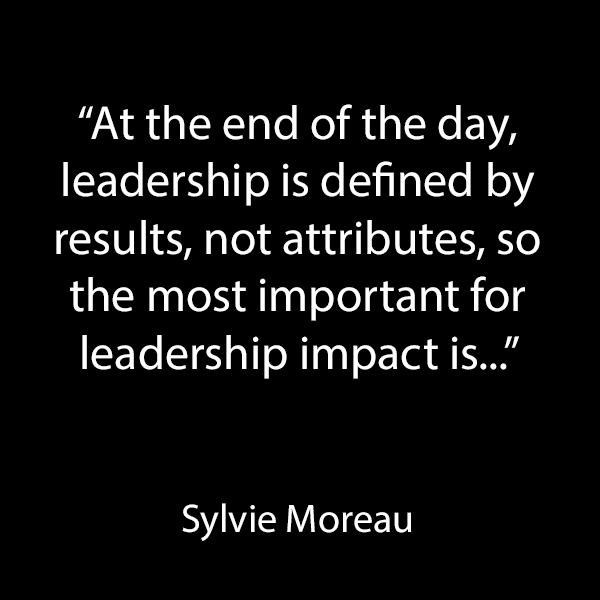Girl Boss Sylvie Moreau, President Of Coty Professional Beauty, Shares 10 Secrets To Being A Great Leader
As a salon owner, your attention often gets pulled in many different directions. Does it sometimes leave you feeling like you could be doing better as a leader? In an article posted to LinkedIn, Coty Professional Beauty President Sylvie Moreau shared 10 lessons she’s learned throughout her decades-long career that will help leaders maximize their impact. Read her words of wisdom below!
Being an effective leader is critical to success of individuals, teams and whole organizations. Whether you are looking to launch a product, create your own company or lead a big organization, nothing happens without strong leadership. But sometimes we wonder whether we are good at it or not, and if anything can be done to help improve the impact we have as leaders. The first good news is, it’s very much an acquired and learned skill—leaders are made, not born. The second good news is that, in my experience, growing as a leader is a key part of one’s personal development and a learning curve that for those that do it the best should keep on going throughout our working life.
Personally, I feel fortunate to have worked with and learned from many great leaders throughout my career. I spent two decades at the leading global FMCG company P&G, where I have learned most of my leadership lessons. Fifteen months ago I joined Coty, an exciting new challenger in beauty, which has provided me with new perspectives and huge personal growth opportunity.
While I feel that I am still learning every single day, here are my 10 personal key lessons on maximizing your impact as a leader.

1. Know Your Stuff
The first and most determining factor for a winning plan is to know the landscape inside out. Be pedantic and meticulous about assessing the landscape— spend time analyzing your category, your consumer, your competition, your own brand history. Go deep. Peel the onion. Be curious. Know the facts. Take time for on-boarding as you take on a new role or start a new project. Be disciplined about this critical phase. Plan “study” time before action. This is not only important for your projects, but also to build yourself and your reputation. The most reliable foundation is knowledge-based leadership, so you need to create solid foundations for yourself to lead effectively.
2. Set The Agenda
Take the lead on defining the vision. It starts by being clear about where you are now (a step most organizations neglect), before you define where you want to be in the future. Whatever role or level you have in an organization, whichever new challenge you are given, spend time formalizing the strategy up front. It includes being clear about objectives and goals, as well as the building blocks to get there. Choose where to play and define how you can win in those segments. An aligned strategy allows you to be the best steward of the business, increases your influence and rallies the whole team.
3. Be Accountable For The Execution
It was famously said that execution is the only strategy that consumers ever see, and I wholeheartedly agree with that. You may not be held personally accountable for doing the execution yourself, but you will be held accountable for the execution in the end, so make sure you set up systems to guarantee superb execution. Be relentless on operational excellence with your team, where it counts. Stay disciplined and detailed. Never be afraid to intervene personally on things that are important. Relatively small issues in a board room can be a huge turn-off for customers or consumers. Always hold a reality mirror up for your people when they present you a plan. Is it executable? How will it look on shelf? Won’t consumers be confused? Is it easy to understand and execute? These are all areas you can (and need to) make a tremendous impact, personally.
4. Build A Great Team
Remember this: If your team looks good, you look good! You are in charge of your team.
- First, you own people planning. Be proactive on talent supply and having available options ideally when a role opens up. Select with high standards, and select for talent and culture fit, not simply experience. Rather wait for the perfect team member than fill a role with whoever is available at the point in time. Build and leverage a diverse team. It is the richest source of talent, new ideas and deep insights. This is what is called “unduplicated leadership.”
- Make the tough people calls early. If you won’t, no one will. When asking top leaders what is their biggest regret in business, most would say not acting fast enough on moving people out in case of performance or culture fit issues.
- Define your team broadly, think multi-functionally, think across geographies, think end to end and be inclusive of external partners (like agencies). Your team is always larger than what the organization chart says. Consider ways to ensure team members who are not based in same location are enrolled and feel part of the team.
5. Be A Coach
Recognize the power of developing people as the way to achieving your business goals. Get teams and people below you thriving. Coach, coach, coach. The key to your future success is getting others up to their pace. So invest as much time, if not more, into coaching and team development as on anything else. Whenever confronted with a choice, always go for coaching first.

Delegate effectively via setting expectations. Manage by setting boundaries with freedom in the middle. Get out of the way. Let people do their bit. Tell them what is wanted then let them get on and deliver. You will most empower your team by getting clear on success criteria and the role you want to play. And when setting expectations, define the right outcomes, not the right steps.
6. Build Your Network
Everyone builds relationships in the course of doing their work. So you already have a set of contacts. What’s needed though is not merely contacts but a network—a set of ongoing, enduring relationships with those you depend on and who depend on you, based on real understanding of each other’s needs and mutual dependencies. It needs to be both present and future oriented. It’s essential to create such relationships before you need them. Weave your own web of connections. Look at each situation as an opportunity to continue to build your network.
I like to think of three networks. First your operational network (those in your group’s daily group). Second your personal (or developmental) network, which includes those who help you grow and provide personal emotional support when you need it. And last and most importantly, your strategic network i.e. those who help you define what the future will bring and prepare for and succeed in that future.
7. Be Proactive And Hungry
The world around us is changing so rapidly that it makes understanding what is really happening today essential. Problems do occur and as a leader, you need to face up to them with brutal honesty and propose solutions very quickly. Don’t sugarcoat a disaster. Again, as a manager, you are pivotal in understanding both the good and the bad news, and doing something about it. If you don’t, who will? Don’t fear. You’ll look much better fixing a problem than sitting on it without your bosses knowing! Great leaders take action and do something about issues, versus protesting them.
Move fast. The greatest gap in life is between “knowing” and “doing.” Speed up decision-making and set aggressive deadlines. It is often more important that you decide than what you decide. Stick to the deadlines and make your people do as well; it will lead to discipline in your group and make you reliable to the outside.
And stretch! Believe in the power of big, game-changing ideas. Look at the world as an opportunity to innovate—continuously! This requires not only a true understanding of the marketplace, but also an ability to think out of the box, to constantly ask yourself, “How do I reconfigure the market to my advantage?” Have a flexible mind and the courage to create disruptions and risk failure.
8. Leverage Your Boss
One leader deserves special attention: your boss. Make sure you make the most of this critical relationship vs. neglect or mishandle it. The consequences of a poor relationship are many—less influence, little information or advice, fewer resources and limited personal development and support. Building trust with your boss is key for them to leave you enough space vs. micro manage you and your business.
Start by seeking to know each other. Understanding his/her background and experience as well as his/her preferences is crucial. Do you know how your boss prefers to make decisions? Are you clear on their pressure points and hot buttons?
Make sure your boss knows you. Tell them what you need. Sometimes we make the mistake of expecting our leaders to read our minds, and we resent them when they fail to give us what we need. Instead of waiting for them to figure it out, tell them. Ask questions when you need information, make requests when you need resources and be open about your challenges.
And use your boss as a coach. You can leverage your boss’ influence in the organization for example by obtaining valuable info, winning needed resources, bursting barriers and securing important support for your projects, personal development and your career. When you face difficult trade-offs or business situations, your boss’s advice, insights, knowledge of the organization and access to higher management can be invaluable. Your boss can help you grow and develop. Make sure that you communicate to him or her you see him as a coach and supporter more than as a judge. And that you are eager to learn.
9. Keep Learning
Do not fall in the trap of complacency. Recognize that the bar goes up every step of the way. Personal growth is the single biggest factor for our careers. The real truth is that everyone is talented and the difference over time comes down to who keeps growing every day. So, ask yourself each day, “Am I better than I was yesterday, and am I prepared to learn and be better tomorrow?” Seek to grow each day. Be proud to be eminently coachable. Watch, listen, be open and learn constantly. Carve out time for your self-development, deliberately. Beyond yourself, create a learning (vs. knowing) culture in your team. Be in a personal growth mindset
10. Self-care!
This is one of the toughest I think, feeling responsible for taking care of yourself and actually doing it. There is a compelling need to do so if you are fine, everyone is. Put yourself first.
Here are a few of my tips:
- Sleep is your best fuel.
- Make time for yourself/Have “me time” rituals.
- Do more of what you love, at home and at work.
- Know your out of balance symptoms and act on them.
- Know your weaknesses and pressure points and find coping mechanisms.
- Have someone to call when you need to.
- Take your vacation, regularly.
- Be an optimist—it is the best way to drive your happiness and also your health.
- Have fun in life and at work and show it!
Let me close with what’s possibly the most important thing about leading with impact. At the end of the day, leadership is defined by results, not attributes, so the most important for leadership impact is to deliver or (even better) exceed expectations!







